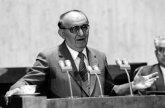Difference between revisions of "Bulgaria's hard liner relents"
(Created page with "=== November 10th === Bulgaria's hard liner relents Zhivkov resigns, change sweeps through the country November 10th: As Bulgaria would prove on this day, even the most hard...") |
(→November 10th) |
||
| Line 1: | Line 1: | ||
=== November 10th === | === November 10th === | ||
| − | + | [[File:Tbwnov10.jpg|400px|thumbnail|left]] | |
Bulgaria's hard liner relents | Bulgaria's hard liner relents | ||
Zhivkov resigns, change sweeps through the country | Zhivkov resigns, change sweeps through the country | ||
| Line 16: | Line 16: | ||
The protesters' demands for change would pay off. In June of 1990, Bulgaria would hold its first free elections since 1946. Bulgaria, which for years existed as one of the most hard line of Soviet Satellite States, would re-invent itself as a fledging democracy. One which would see stabililty and progress as the years of Communist rule faded into memory. | The protesters' demands for change would pay off. In June of 1990, Bulgaria would hold its first free elections since 1946. Bulgaria, which for years existed as one of the most hard line of Soviet Satellite States, would re-invent itself as a fledging democracy. One which would see stabililty and progress as the years of Communist rule faded into memory. | ||
| − | [[Category: | + | [[Category:The Berlin Wall 1961-1989]] |
Latest revision as of 09:06, 31 March 2014
November 10th[edit]
Bulgaria's hard liner relents Zhivkov resigns, change sweeps through the country
November 10th: As Bulgaria would prove on this day, even the most hard line Communist leaders were not immune to the revolutionary changes sweeping throughout Europe.
Communist Party leader Todor Zhivkov, who had ruled Bulgaria with an iron first for nearly 34 years, resigned.
While he resigned publicly, a vote by the Communist Party Central Committee effectively forced him out of office, where he was replaced by Foreign Minister Petar Mladenov, who was more open to initiating reform throughout the country.
The Central Committee's decision was a response to the growing public protests that were forming throughout the country. Where once opposition to the government was dealt with swiftly and brutally, brazen and outspoken civil rights groups such as Eco-Glanost openly defied the government and proved to ordinary Bulgarians that they could stand up to the repressive regime.
Within days of Zhivkov's resignation, tens of thousands protested the Communist government. They tore up pictures of Zhirkov and demanding democratic changes be implemented.
The protesters' demands for change would pay off. In June of 1990, Bulgaria would hold its first free elections since 1946. Bulgaria, which for years existed as one of the most hard line of Soviet Satellite States, would re-invent itself as a fledging democracy. One which would see stabililty and progress as the years of Communist rule faded into memory.
